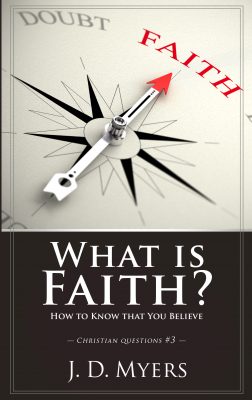(#AmazonAdLink)  If faith is best understood as reasonable certainty then this means that we either believe something or we don’t. If we doubt something, then we don’t believe it.
If faith is best understood as reasonable certainty then this means that we either believe something or we don’t. If we doubt something, then we don’t believe it.
If we think of our network of beliefs as a vast Excel spreadsheet with each individual cell holding a single statement that we either agree with or not, then this means that there are no degrees of faith. You cannot have 10%, 50%, 90%, or even 99% faith. Each individual belief on the spreadsheet of faith is either “On” or “Off.”
But if this is true, then what are we to make of the statements by Jesus about people having “little faith” and “great faith”? (cf. Matt 6:30; 8:26; 14:31; 16:8; Luke 4:14-30; 12:28).
There are also numerous passages in the Bible which seem to indicate that we must have “enough faith” before God answers our prayers (cf. Matt 13:58; 21:22; Mark 11:24; Luke 7:9, 50; 18:42; Jas 5:15-16).
But if there are no degrees of faith, then what do these descriptions of faith mean?
What is “Great Faith” and “Little Faith”?

The terms “Great faith” and “Little faith” simply mean this: Some truths are easy to believe while others are difficult. If you believe something that is difficult to believe, then you have great faith. If you do not believe something that is relatively easy to believe, then you have little faith.
Since faith is the conviction or persuasion that something is true, people who have little faith have not been persuaded or convinced of even the basic truths, whereas, people who have great faith have been persuaded or convinced of some of the hard and difficult truths which few people come to believe.
You and I do not have faith containers in our souls which overflow when our faith is great, but are nearly empty when our faith is little. Faith does not work like that.
Great faith and little faith have nothing to do with the size, amount, or degree of faith.
Rather, the terms “great faith” and “little faith” describe the difficulty of the truths that are believed.
When a person fails to believe even some of the simple or easy truths, this means that some of the basic, fundamental cells in their network of beliefs are turned “Off.” Since they do not believe these simple truths, vast segments of their spreadsheet are also turned “Off.”
Their spreadsheet is darkened with unbelief because they don’t even believe some of the simple, foundational, basic truths of life or Christianity.
They have little faith, that is, an undeveloped and unexamined spreadsheet of beliefs. On such a spreadsheet of faith, most of the basic truths are still turned “Off.”
On the other hand, there are some people who have great faith. These are those people who are persuaded or convinced of some difficult things to believe.
People who have great faith believe truths and ideas that relatively few people understand and believe.
There are truths in Scripture, life, and theology that are hard to believe, but people with great faith believe them. Such ideas often take great thought, insight, understanding, research, investigation, or deep spiritual experiences in order to believe them.
When people come to believe these things, they believe something that few others believe, and can therefore be described as having great faith. Vast segments of their spreadsheet of beliefs are lit up with the light of the truth of God.

Some examples about great faith and little faith from Scripture
There are numerous truths from Scripture that are easy to believe.
These might include the statements that “A man named Jesus existed” or that “I am a sinner.” Almost everybody believes these, including most non-Christians.
Yet people with little faith do not even understand or believe these truths. People with little faith have trouble believing some of the simple, elementary, and introductory truths of Scripture, such as “God is love” or “Jesus gives eternal life to anyone who believes in Him for it.”
It is a telling fact of the condition of faith in our churches when most Christians don’t truly believe these things. As simple as these truths are, many do not believe them.
However, there are other truths in Scripture which are hard to believe. People who believe these difficult truths have great faith. For example, it is difficult to believe that “God will supply all of your needs according to His riches in glory” (Philippians 4:19).
Frankly, since I often worry about tomorrow, this means that I don’t believe this promise. I don’t believe that God will supply all my needs, and often find myself trying to supply for my own needs. So this means I don’t yet believe this statement. But those who have great faith believe it. (See “Now That’s Faith!“)
So great faith and little faith have nothing to do with the amount of faith one has, or the percentage to which one believes a particular fact. Faith does not come in degrees or amounts.

An Example of Great Faith from Matthew 8:10
There are two kinds of faith that amazed Jesus: great faith and little faith. As seen above, there were times when Jesus marveled at the little faith of His disciples (cf. Matt 6:30; 8:26; 14:31; 16:8; Luke 4:14-30; 12:28).
But in Matthew 8:10, Jesus was impressed by the great faith of a Gentile. He said, “I have not found such great faith, not even in Israel!” (See my sermon on Luke 7:1-10 for a longer explanation of this text.)
In Matthew 8:10, Jesus praises a Roman Centurion for having great faith.
What did the Centurion believe that few others believe? He believed two advanced truths that are quite rare for people to believe (even today).
First, he believed in his own lack of merit. Though he was courteous, humble, and a good man, though he loved the Jewish people and built a synagogue for them, he knew he didn’t deserve anything from God, or from Jesus Christ. Despite his high standing and all he had done, he knew he was unworthy to meet with Jesus (Matt 8:8).
Most people do not believe this.
Most people think they do deserve favors from God. Most people think they are pretty good people and that God owes them something. It is much harder to believe that all we have and all we are given is simply and only by the grace of God. But the centurion believed this, and told Jesus that he was not worthy to have Jesus visit his house.
The second thing the Centurion believed is that healing could be done at a distance. He believed in the divine authority of Jesus, even over sickness and disease through space and time. He likened Jesus to a military commander who simply had to give orders for them to be followed (Matt 8:9).
The Centurion knew that what Jesus commanded would be done, even if Jesus was not present where the healing was to take place. He knew that the words of Jesus were sufficient to accomplish whatever He said.
Most people do not believe this. Most people believe, even today, that if a person is going to be healed, they need to be touched by the person praying for them. They believe that they have to go visit the healer, and have the healer lay hands on them, say special prayers over them, and anoint them with oil.
If a person was seeking healing for their friend and they went to one of the “miracle healers” of today for help, and the healer said, “Go home, your friend will be fine,” that person would feel like they had been ignored, slighted, or brushed off.
But this Centurion knew differently. The Centurion believed some truths that few others believed. He believed that if Jesus wanted to heal someone, He could do it with a simple word and from a great distance.
He told Jesus, “Only speak a word, and my servant will be healed” (Matt 8:8).
This truly is great faith, and few believe such an idea, either in the days of Jesus or today. As a result, Jesus marveled at this man’s great faith, and healed his servant from a distance, simply by the power of His word.
All of the other “great faith” passages in the Bible can be understood in similar ways. The context always reveals that someone is believing something that is difficult to believe, and that few people do believe.
So great faith is not a large amount of faith or a high percentage of faith. Great faith simply believes truths that are difficult to believe.
Do you have more questions about faith, how it works, and what various passages in Scripture teach about faith? Try taking my online course, The Gospel Dictionary:
 Understanding the Gospel requires us to properly understand the key words and terms of the Gospel. Take my course, "The Gospel Dictionary" to learn about the 52 key words of the Gospel, and hundreds of Bible passages that use these words.
Understanding the Gospel requires us to properly understand the key words and terms of the Gospel. Take my course, "The Gospel Dictionary" to learn about the 52 key words of the Gospel, and hundreds of Bible passages that use these words.
This course costs $297, but when you join the Discipleship group, you can to take the entire course for free.




We need great faith when it comes to God’s providence in our lives.
You use want insread of went. In one of your sentence. Proffered read what you said, it helps but I understood you. Maybe later I might subscribe. Shalom
Thanks! This is fixed now.
By the way, you used “proffered read” instead of “Proof read.” Proof read what you write. It helps. But I understood you. 😉
Classic exchange. I laughed out loud and my son heard me. Again, a classic! Selah.
“It is a telling fact of the condition of faith in our churches when most Christians don’t truly believe these things.”
If faith, as you say, does not come in degrees, then what is the difference between “believing” and “truly believing?”
Jeremy, thank you. Your description of faith and a spread sheet to distinguish segments of what we believe or don’t makes perfect sense. The bible says we have been given the measure of faith. (KJV Romans 12:3) Earlier this year I prayed for my wife who had cancer in her face. Two weeks later she went in for surgery to remove it. That day another Xray was taken and nothing appeared. Then a second machine was used and nothing appeared. The doctor requested the previous Xray taken several weeks before and there it was. The doctor told my wife this was a miracle and sent her home. I shared this testimony with one believer and his response was the doctor must have mad a mistake. Another believers response was Praise God! Your article above sheds a lot of light for me Thanks!
Thank you very much. Your info was very good and easy to understand. God bless you.
Increasing my Faith after receiving your teaching.
Every unlearnt is difficult,every known is easy.Faith is the substance of things hoped for,Joshua was told to meditate the word,why?to cultivate his faith,Paul planted, Apollos watered and God give the increase.Faith is a seed God sows in us,it grows, faith grows
Everything from God to man is measured,only man can not measure God
I don’t believe what you say is true
You say LITTLE FAITH is to not believe something easy to believe!
Question: When Peter doubted and sink, the fact of believing was it easy! Was it easy to think that WALKING in water was an easy thing.
1. FAITH DO GROW IS IT GROWS BY HEARING THE WORD OF GOD (RHEMA)
2. THERE IS SAVING FAITH WHICH ALL WE RECEIVE EQUALLY, THEN WE MUST WORK TO GROW IT OTHERWISE, WE WILL BE DEFEATED BY ALL CALAMITIES.
Thank you brother for your matter of fact article on faith. It was very good.
But I see faith as a far more organic situation happening within us as believers, something we could only do intellectually for the most part before The Holy Spirit regenerated our “inner man”, our other body which we all agree holds our immortal consciousness.
Before that body was reborn, quite ‘literally’, we couldn’t even see The Kingdom of God. Nicodemus echoed the confusion of us all at this strange and most amazing miracle of all, that we can become children of God through becoming one with Jesus in His life, death and resurrection.
I see faith then as the currency of Heaven when I want something, because or course, I still am full of needs and desires like a baby bird. But faith isn’t a credit card from God. He wants us to want His will.
I see faith as the language of God. In my mind, which only has shadowy images of these mysteries, Angels ‘faith’ to God and He to them in non-linear instantaneous downloads of communication. All at once. God does this with us sometimes. We grasp a truth in a holistic way we could never have without hours or weeks of step by step study. Revelation is like this.
I believe Jesus explained faith as though it were for dummies. For we are indeed dull, even as Christians! At least I am. Sometimes so much it amazes me. Who will save me from this body of death and my infrequent utter stupidity. Praise be to God for His Son Jesus and The Blesses Holy Parent as I often think of His Spirit who indwelling us, comforts and teaches us, wipes our snotty noses and reminds of to wash off the grime of sin.
I’ll sum it up by saying that a lack of faith is not a concept Adam & Eve likely would grasp, even after the fall, as they still had memories of God’s face and walks when it was pleasantly cool.
Nor would the Angels have ever understood what a lack of faith would look like without observing us. It is the natural state of God’s children to be perfect, immortal and overflowing with love, as well as utter faith. Total trust that flows in the marrow of their bones and in each cell of their bodies.
I don’t believe the issue is intellectual ascension or acceptance. Faith is not squeezing our brains until we convince ourselves God parted the Red Sea though this happens because we have an intellect.
No, Jesus made it clear. Even a mustard seed of faith can move mountains. The tiniest ‘amount’, portion or measure of this reality, substance, state of being was enough for the impossible to be done on our behalf.
Healing was commonplace at my first long term church. I was college age when I met Jesus so I moved around for a bit. I’ve prayed and seen miraculous healing happen before my eyes. But even more miraculous was the time God stopped me as I was about to pray for a man. God made me understand in an instant the man had transgressed somehow.
As I began to respond to his bewildered face about why I retreated from touching his ankle, mentioning God said he had done something…..the man immediately gushed all his wrong choices and the burden of guilt God had laid on his head all day. He was so ready to repent and return the expensive item that cost as much as his rent, which his wife was unhappy about, unsurprisingly!
Then God told me to pray. His swollen ankle the size of a grapefruit became normal in seconds and he had no pain or apparent injury.
I also see faith as part of an intimate relationship with God. Faith is relational since its always about a person, whether a spouse, a child, a boss or The Almighty. It can be about a car engine starting as well but that’s more or less academic.
Faith was even the lifeblood of Jesus’s ministry and walk with His Father. For me it is something I wrestle with. When I am asking God for miracles, to alter reality as it stands, He often puts his arms out like a wrestler. He won’t always just hear me out. He wants me to struggle with Him. To sweat and exert myself until glistening with reflected glory.
It is marvelous, mostly. No one likes being reminded of their failures and my flesh is lazy and contrary to God, even after decades of being in Christ.
Prayer is the key and always has been. Jesus did it daily and often, privately and publicly. It is what unlocks all we could ever need or rightly want from God
I hope I shared something useful. God Bless you all and strengthen all of our faith in God!
I am new on my walk with God and your post resonated with me! It helps to understand that the level of faith is aligned with the complexity of the belief! Thanks for sharing and God bless!
Great stuff. Thank you for sharing.
My prayer is this: May God give me great faith that will enable me to abandon the comfort of today’s good life for a better life that God promises me in His word. Yes I agree and believe that great faith means believing God can do what He says He can do. I need to be practical on this such that after my faith has been proven to be great it can encourage someone to believe God is real.
explain to me this three kinds of faith
a. weak faith
b. little faith and
c. great faith.